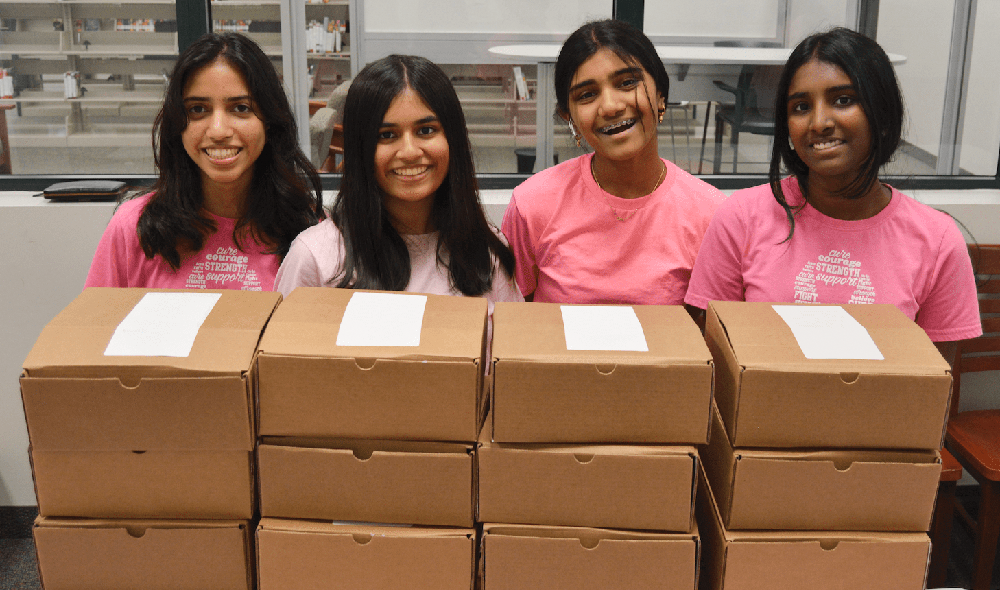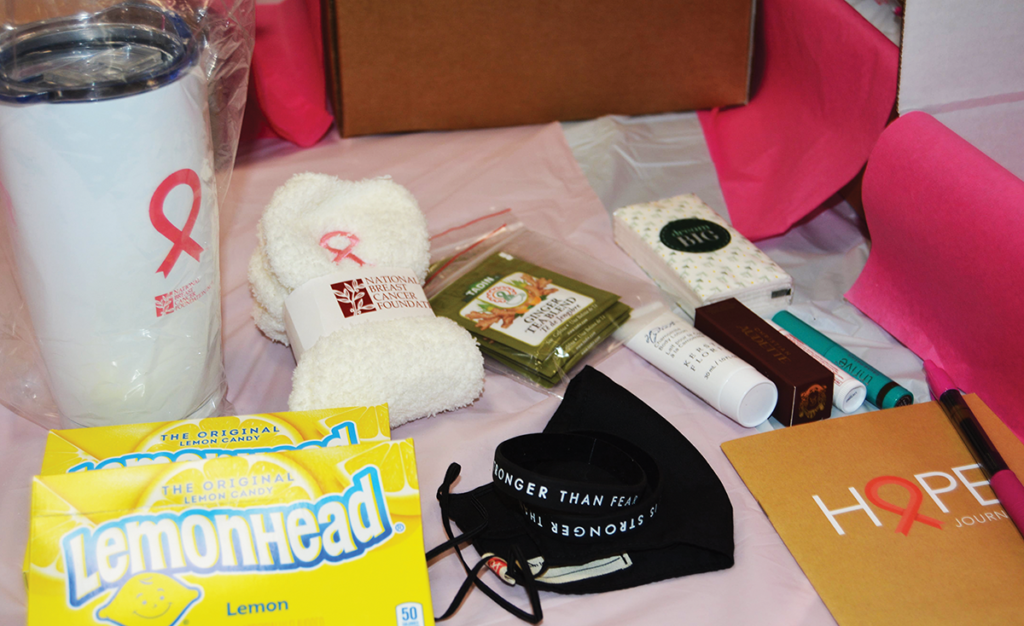
As most people know, October is “National Breast Cancer Awareness Month” across the U.S. and here in Tampa, the AdventHealth Care Pavilion at 8702 Hunter’s Lake Dr., in front of the Hunter’s Green community on Bruce B. Downs (BBD) Blvd., hosted a breast cancer awareness event on Oct. 3 to encourage women to get their mammograms.
“One in eight women will be touched by breast cancer in their lifetimes,” said Dr. Rachel Burke, the medical director and head breast radiologist at the Kay Meyer Breast Care Center at AdventHealth Tampa. “The median age is around 62 and the highest risk is for those over age 70, but we diagnose it in all ages. Pretty much everyone knows someone who has been affected by it. I always tell people that the biggest risk factors for developing breast cancer are being born female and getting older — and if you’re alive, you’re getting older, so nobody is immune to it.”
In fact, she said, “This year alone, more than 300,000 women will be diagnosed with invasive breast cancer, the kind that can possibly spread, and another 56,000 with the non-invasive or ‘Stage 0’ breast cancer, and that’s just here in the U.S.”
Dr. Burke says that not only is a mammogram the only diagnostic test approved by the U.S. Food & Drug Administration (FDA), it also is the “gold standard” for detecting breast cancer.
“And honestly, it’s so easy,” Dr. Burke said. “It only takes a few minutes, isn’t painful and it can definitely save your life. I don’t know why some women have built it up in their heads that it’s this scary thing. It’s really just a couple of seconds of pressure on each side.”
She added that she started as a diagnostic radiologist specializing in breast radiology, “before I turned 40, so I hadn’t actually had a mammogram myself yet. But, I had heard many scary things about mammograms from patients. And, when I finally had mine, I said, ‘OK, that wasn’t so bad.’ I didn’t know what the whole fuss was about. It was over and done with so fast and wasn’t terrible at all.”
Dr. Burke also said that since the 1990s, with widespread screening becoming the norm, “Mortality from breast cancer has been reduced by 40% and up to 50% in some studies. Yes, it works. I don’t know why anyone wouldn’t want to have a test that took five minutes of their time that could save their life.”
Cost Isn’t An Issue
And, she noted that considering that an annual mammogram is a covered test for women over age 40 on virtually all health insurance plans, “Cost isn’t an issue, either. Even if you don’t have insurance, there are programs — like through our AdventHealth Foundation — that offer free or low-cost mammograms to women, regardless of their insurance status, if they can’t afford to get one. We will find a way to help you”
In addition, Dr. Burke said, “Most mammography facilities offer special programs and lower fees during October. I know we have a special for a $99 mammogram this month.”

Dr. Burke also noted that although African American women have a lower incidence of breast cancer when compared with Caucasians and other races, “They have a higher mortality rate from it. We don’t know exactly why — but Black women have a higher incidence of dense breast tissue and there are some other factors, including socioeconomic, but it absolutely is something to be aware of. We don’t want any women to die from breast cancer, but we also don’t want this type of disparity either.”
Speaking of breast density, however, Dr. Burke said that it is harder to read the mammograms of women who have more dense, glandular tissue than fatty tissue, which puts any woman with dense breasts at higher risk for breast cancer.
“Mammograms are still our best diagnostic tool,” she said, “but the test isn’t perfect. Just as it’s harder to see when you’re driving in dense fog, it’s harder to read the mammograms through dense breast tissue. Some women will need a supplemental test — like an MRI or ultrasound — if they have dense breasts and there’s a concern.”
Dr. Burke also talked about BRCA1 and BRCA2 genetic mutations, which significantly increase a woman’s risk of developing breast cancer. Statistics show that 55%-65% of women found with a BRCA1 mutation and 45% of women with a BRCA2 mutation will develop breast cancer by age 70.
“More and more celebrities are coming out and discussing that they have gotten prophylactic bilateral mastectomies and reconstruction after being found with either mutation,” she said. “You know, the Angelina Jolie effect. So now, there are a lot of women with these mutations who aren’t celebrities who were inspired by that and also are having mastectomies to prevent breast cancer and that’s great. A surgery without cancer is easier to recover from than a surgery with cancer.”
And now, she added, “We have found a lot of different genes that are proving to be risk factors not just for breast but for a lot of different cancers.”
Dr. Burke also said that although there are some risk factors that women can’t change, like aging and genetics, “The risk factors we can change are alcohol consumption, diet and exercise and smoking. I never tell women they have to give up alcohol altogether,” she said. “I still like to have a glass of wine, too, and I have friends who are oncologists who still have a drink here and there. All we say is to limit your alcohol consumption because it definitely is related to breast cancer.”
She also noted that it’s important to tell women who are diagnosed that, “It’s not your fault. I tell them, ‘You did not cause this. This is one rogue cell that decided to proliferate. There wasn’t one particular thing you did to cause it.’”
The stage of the cancer itself also is important. “The chance for long-term survival goes down with each stage,” Dr. Burke said. “However, even though we can’t ‘cure’ Stage 4, we do have many patients who live for a number of years with Stage 4 disease.”
Dr. Burke then demonstrated how a mammogram works in the Care Pavilion’s Mammography Suite. And, after the interview,Charmaine and I enjoyed pink cupcakes, donuts and lemonade with the Care Pavilion staff, who also painted provided stones pink with the name of someone they lost to the disease for the Care Pavilion’s garden. They also took home pink light bulbs.
For more info about AHCP, call (813) 548-8550, visit AHCarePavilionNewTampa.com.



